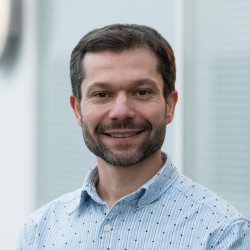
Dr Dimitar Kutsarov
About
Biography
Dr Dimitar Kutsarov is a Research Fellow at the Nano-Electronics Centre of the Advanced Technology Institute (ATI). He is responsible for the scaling-up of various flexible- and printed electronic devices, such as solar cells (organic- and perovskite-based), sensors, transistors, RFIDs, and batteries. He believes that if a device can be printed in the laboratory, it can also be fabricated on an industrial scale.
Dimitar obtained a doctoral degree in engineering and physical sciences from the University of Surrey in 2017 with a PhD research project on ‘Large-area slot-die coated organic photovoltaics with high efficiencies’. Upon re-joining the University in 2021, he was tasked with designing and setting-up a cutting-edge research laboratory for the up-scaled fabrication of novel technologies – the Scaled Printing Laboratory (SPL). He now collaborates closely with industry looking into novel materials suitable for the next generation of solar cells as well as with many UK- and international research groups. Dimitar is the project manager of a multi-million Pound EPSRC project entitled ‘High-Efficiency Flexible and Scalable Halide-Perovskite Solar Modules’ and coordinates and manages the research activities within the ATI for the Horizon 2020 project ‘Musicode’. Dimitar is also responsible for the research supervision of undergraduate and postgraduate students.
Prior to returning to academia, Dimitar gained valuable experience in industry, working for the world leader in the fabrication of organic photovoltaics – ASCA GmbH (at the time OPVIUS GmbH). He started at the company as a research scientist and was soon promoted to the role of senior research scientist, and then Head of Manufacturing. He was responsible for the planning and execution of front-end and back-end production of various OPV products. He was also responsible for improving the production landscape and establishing new production processes, whilst complying with high safety standards.
Dimitar’s affinity for printed electronics and opto-electronic devices started whilst studying for his Diploma Degree in Engineering and Information Technology, which he obtained from the Karlsruhe Institute of Technology (KIT) in Germany, in 2012.
ResearchResearch interests
Dimitar likes to spend time “playing” (aka working) with the equipment in the SPL and pushing it to the limit of the machine’s capabilities. He is busy developing novel laser processes and laser designs for the next generation of photovoltaics and bio-medical sensing. Additionally, he is currently developing a process for the large-scale fabrication of perovskite- and organic photovoltaics by using the roll-to-roll slot-die coater in the SPL.
Research interests
Dimitar likes to spend time “playing” (aka working) with the equipment in the SPL and pushing it to the limit of the machine’s capabilities. He is busy developing novel laser processes and laser designs for the next generation of photovoltaics and bio-medical sensing. Additionally, he is currently developing a process for the large-scale fabrication of perovskite- and organic photovoltaics by using the roll-to-roll slot-die coater in the SPL.